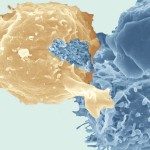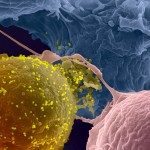Link to Pubmed [PMID] – 33851216
Link to DOI – 10.1093/cid/ciab308
Clin Infect Dis 2021 09; 73(6): e1337-e1344
Humoral response to severe acute respiratory syndrome coronavirus 2 (SARS-CoV-2) occurs within the first weeks after coronavirus disease 2019 (COVID-19). Those antibodies exert a neutralizing activity against SARS-CoV-2, whose evolution over time after COVID-19 as well as efficiency against novel variants are poorly characterized.In this prospective study, sera of 107 patients hospitalized with COVID-19 were collected at 3 and 6 months postinfection. We performed quantitative neutralization experiments on top of high-throughput serological assays evaluating anti-spike (S) and anti-nucleocapsid (NP) immunoglobulin G (IgG).Levels of seroneutralization and IgG rates against the ancestral strain decreased significantly over time. After 6 months, 2.8% of the patients had a negative serological status for both anti-S and anti-NP IgG. However, all sera had a persistent and effective neutralizing effect against SARS-CoV-2. IgG levels correlated with seroneutralization, and this correlation was stronger for anti-S than for anti-NP antibodies. The level of seroneutralization quantified at 6 months correlated with markers of initial severity, notably admission to intensive care units and the need for mechanical invasive ventilation. In addition, sera collected at 6 months were tested against multiple SARS-CoV-2 variants and showed efficient neutralizing effects against the D614G, B.1.1.7, and P.1 variants but significantly weaker activity against the B.1.351 variant.Decrease in IgG rates and serological assays becoming negative did not imply loss of neutralizing capacity. Our results indicate a sustained humoral response against the ancestral strain and the D614G, B.1.1.7, and P.1 variants for at least 6 months in patients previously hospitalized for COVID-19. A weaker protection was, however, observed for the B.1.351 variant.


